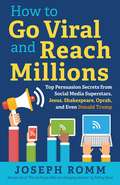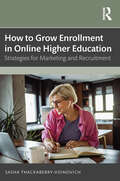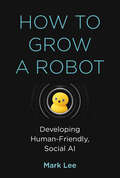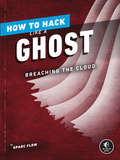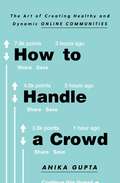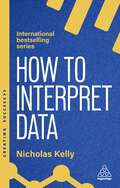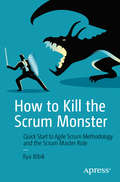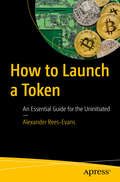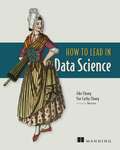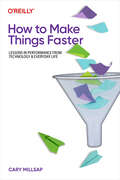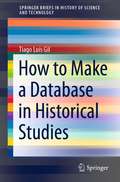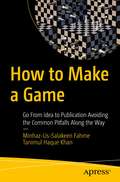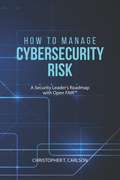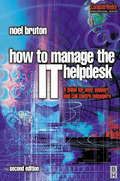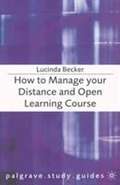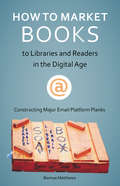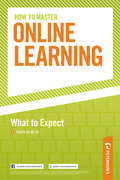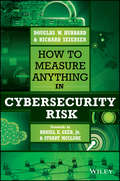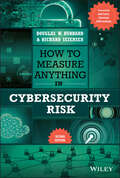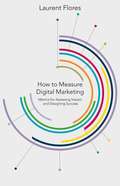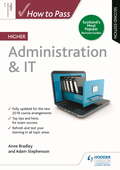- Table View
- List View
How to Go Viral and Reach Millions: Top Persuasion Secrets from Social Media Superstars, Jesus, Shakespeare, Oprah, and Even Donald Trump
by Joseph RommHow to Go Viral and Reach Millions is the first book to reveal all the latest secrets for consistently generating viral online content-words, images, or videos that are seen and shared by hundreds of thousands and eventually even millions of people, something Romm and his colleagues in three different organizations achieve routinely.
How to Grow Enrollment in Online Higher Education: Strategies for Marketing and Recruitment
by Sasha Thackaberry-VoinovichHow to Grow Enrollment in Online Higher Education offers practical guidance on how to more effectively attract and recruit students to online college and university programs. Despite the proliferation of online degree and certificate programs, only a handful of large, name-brand institutions have the resources to master the challenges of marketing and recruitment. This book includes a first-of-its-kind blueprint for colleges and universities working to set up online programs that can grow their enrollment and support their operations financially. These accessible chapters provide step-by-step marketing strategies, detail the specific needs and values of fully online enrollees, and explore the staffing, talent, and technologies needed to competitively recruit new students.
How to Grow a Robot: Developing Human-Friendly, Social AI
by Mark H. LeeHow to develop robots that will be more like humans and less like computers, more social than machine-like, and more playful and less programmed.Most robots are not very friendly. They vacuum the rug, mow the lawn, dispose of bombs, even perform surgery—but they aren't good conversationalists. It's difficult to make eye contact. If the future promises more human-robot collaboration in both work and play, wouldn't it be better if the robots were less mechanical and more social? In How to Grow a Robot, Mark Lee explores how robots can be more human-like, friendly, and engaging.Developments in artificial intelligence—notably Deep Learning—are widely seen as the foundation on which our robot future will be built. These advances have already brought us self-driving cars and chess match–winning algorithms. But, Lee writes, we need robots that are perceptive, animated, and responsive—more like humans and less like computers, more social than machine-like, and more playful and less programmed. The way to achieve this, he argues, is to “grow” a robot so that it learns from experience—just as infants do. After describing “what's wrong with artificial intelligence” (one key shortcoming: it's not embodied), Lee presents a different approach to building human-like robots: developmental robotics, inspired by developmental psychology and its accounts of early infant behavior. He describes his own experiments with the iCub humanoid robot and its development from newborn helplessness to ability levels equal to a nine-month-old, explaining how the iCub learns from its own experiences. AI robots are designed to know humans as objects; developmental robots will learn empathy. Developmental robots, with an internal model of “self,” will be better interactive partners with humans. That is the kind of future technology we should work toward.
How to Grow as a Photographer: Reinventing Your Career
by Tony LunaAre you bored producing the same old work, but do it because it's safe? Are corporate politics, outsourcing, or the digital revolution too much for you to handle? Has a personal tragedy caused you to reevaluate your career path? If you answered yes to any of these questions, look no further than this inspirational guide. Topics include: --Recognize when something is wrong --Use work-history and personal timelines to meld your passions with your career choices --Reeducate yourself when faced with creative challenges --Embrace risk and evaluate your assets to make your next move --Sell your unique vision through a "Passion First" marketing approach --Manage your time and your business effectively --Use time-management techniques to stay focused and increase your creative output. You will also be inspired by the stories of other creative entrepreneurs who have made their own successful transitions. Whether you are a mid-career professional or just starting out, this book will set you on the path to creative and professional growth.
How to Hack Like a Ghost: Breaching the Cloud
by Sparc FlowHow to Hack Like a Ghost takes you deep inside the mind of a hacker as you carry out a fictionalized attack against a tech company, teaching cutting-edge hacking techniques along the way.Go deep into the mind of a master hacker as he breaks into a hostile, cloud-based security environment. Sparc Flow invites you to shadow him every step of the way, from recon to infiltration, as you hack a shady, data-driven political consulting firm. While the target is fictional, the corporation&’s vulnerabilities are based on real-life weaknesses in today&’s advanced cybersecurity defense systems. You&’ll experience all the thrills, frustrations, dead-ends, and eureka moments of his mission first-hand, while picking up practical, cutting-edge techniques for penetrating cloud technologies. There are no do-overs for hackers, so your training starts with basic OpSec procedures, using an ephemeral OS, Tor, bouncing servers, and detailed code to build an anonymous, replaceable hacking infrastructure guaranteed to avoid detection. From there, you&’ll examine some effective recon techniques, develop tools from scratch, and deconstruct low-level features in common systems to gain access to the target. Spark Flow&’s clever insights, witty reasoning, and stealth maneuvers teach you how to think on your toes and adapt his skills to your own hacking tasks. You'll learn: • How to set up and use an array of disposable machines that can renew in a matter of seconds to change your internet footprint • How to do effective recon, like harvesting hidden domains and taking advantage of DevOps automation systems to trawl for credentials • How to look inside and gain access to AWS&’s storage systems • How cloud security systems like Kubernetes work, and how to hack them • Dynamic techniques for escalating privileges Packed with interesting tricks, ingenious tips, and links to external resources, this fast-paced, hands-on guide to penetrating modern cloud systems will help hackers of all stripes succeed on their next adventure.
How to Hack Like a Legend: A Hacker's Tale Breaking Into A Secretive Offshore Company (Hacking The Planet Ser.)
by Sparc FlowTag along with a master hacker on a truly memorable attack. From reconnaissance to infiltration, you&’ll experience their every thought, frustration, and strategic decision-making first-hand in this exhilarating narrative journey into a highly defended Windows environment driven by AI.Step into the shoes of a master hacker and break into an intelligent, highly defensive Windows environment. You&’ll be infiltrating the suspicious (fictional) offshoring company G & S Trust and their hostile Microsoft stronghold. While the target is fictional, the corporation&’s vulnerabilities are based on real-life weaknesses in today&’s advanced Windows defense systems. You&’ll experience all the thrills, frustrations, dead-ends, and eureka moments of the mission first-hand, while picking up practical, cutting-edge techniques for evading Microsoft&’s best security systems. The adventure starts with setting up your elite hacking infrastructure complete with virtual Windows system. After some thorough passive recon, you&’ll craft a sophisticated phishing campaign to steal credentials and gain initial access. Once inside you&’ll identify the security systems, scrape passwords, plant persistent backdoors, and delve deep into areas you don&’t belong. Throughout your task you&’ll get caught, change tack on a tee, dance around defensive monitoring systems, anddisable tools from the inside. Spark Flow&’s clever insights, witty reasoning, andstealth maneuvers teach you to be patient, persevere, and adapt your skills at the drop of a hat. You&’ll learn how to:Identify and evade Microsoft security systems like Advanced Threat Analysis,QRadar, MDE, and AMSISeek out subdomains and open ports with Censys, Python scripts, and other OSINT toolsScrape password hashes using KerberoastingPlant camouflaged C# backdoors and payloadsGrab victims&’ credentials with more advanced techniques like reflection anddomain replication Like other titles in the How to Hack series, this book is packed with interesting tricks, ingenious tips, and links to useful resources to give you a fast-paced, hands-on guide to penetrating and bypassing Microsoft security systems.
How to Handle a Crowd: The Art of Creating Healthy and Dynamic Online Communities
by Anika GuptaA guide to successful community moderation exploring everything from the trenches of Reddit to your neighborhood Facebook page. Don&’t read the comments. Old advice, yet more relevant than ever. The tools we once hailed for their power to connect people and spark creativity can also be hotbeds of hate, harassment, and political division. Platforms like Facebook, YouTube, and Twitter are under fire for either too much or too little moderation. Creating and maintaining healthy online communities isn&’t easy. Over the course of two years of graduate research at MIT, former tech journalist and current product manager Anika Gupta interviewed moderators who&’d worked on the sidelines of gamer forums and in the quagmires of online news comments sections. She&’s spoken with professional and volunteer moderators for communities like Pantsuit Nation, Nextdoor, World of Warcraft guilds, Reddit, and FetLife. In How to Handle a Crowd, she shares what makes successful communities tick – and what you can learn from them about the delicate balance of community moderation. Topics include: -Building creative communities in online spaces -Bridging political division—and creating new alliances -Encouraging freedom of speech -Defining and eliminating hate and trolling -Ensuring safety for all participants- -Motivating community members to action How to Handle a Crowd is the perfect book for anyone looking to take their small community group to the next level, start a career in online moderation, or tackle their own business&’s comments section.
How to Interpret Data: Using Data to Improve Your Influence and Decision-making (Creating Success)
by Nicholas KellyThe best business decisions and strategies are always data-driven. Improve your understanding of data and your digital literacy with How to Interpret Data.Data is a cornerstone of our decision-making, but the ability to effectively interpret data is challenging to master. This book demystifies the process of data interpretation, providing you with the tools and knowledge you need to develop smart data-driven strategies.Packed full of fascinating interviews and stories which uncover the potential of data-driven strategies, this book will show you not only how to effectively interpret data, but will also uncover how you can use this knowledge to improve your decision-making and influence at work.
How to Kill the Scrum Monster: Quick Start to Agile Scrum Methodology and the Scrum Master Role
by Ilya BibikImplement Scrum or improve how Scrum works in your team or organization using this concise, sharp, and programmatic book. You will quickly learn what you need to know without getting confused with unnecessary details.What You'll LearnBecome familiar with Agile concepts and understand the path from Waterfall to the Agile ManifestoUnderstand the most commonly used Agile methodology—Scrum—and how it relates to eXtreme Programming and Kanban as well as to Lean principlesIdentify the challenges of the Scrum Master role and understand what this role is all aboutKnow the stages of Scrum team developmentEmbrace and solve conflicts in a Scrum teamWho This Book Is ForAnyone looking for a simple way to understand Scrum methodology
How to Launch a Token: An Essential Guide for the Uninitiated
by Alexander Rees-EvansTake a deep dive into the intricacies of launching and successfully managing a cryptocurrency token. This book is an indispensable resource, providing invaluable insights and practical advice. Spanning 12 chapters, the book begins with the fundamentals, explaining the different types of tokens and the core concepts of crypto projects, guiding readers through the critical decision-making process about the necessity and role of a token in their venture. As the narrative progresses, you are taken on a journey through the lifecycle of a crypto project. It emphasizes the importance of a well-thought-out roadmap, a compelling pitch deck, and the crucial process of assembling a skilled team. Diving deeper, the book explores the complex world of tokenomics, reviewing the various economic models behind tokens and how to tailor them to specific projects. A key aspect of this guide is its focus on go-to-market strategies, including targeting the right audience, effective marketing techniques, and the vital role of community building. Additionally, it addresses the essentials of fundraising in the crypto space, highlighting the types of investors to approach and strategies for engaging them effectively. Security and stability are paramount in the crypto world. The book provides a detailed analysis of the storage and custody of funds, comparing centralized and decentralized mechanisms and emphasizing the importance of robust security measures. This is crucial for ensuring liquidity and accessibility of the token in the market. The guide culminates with a focus on the launch day, detailing the preparation, organization, and key considerations to ensure a successful token launch. When done you’ll be well-equipped to navigate the complex and exciting world of cryptocurrency token launches. What You’ll Learn Develop a successful launch strategy for a token. Prepare the decks and documents for a successful token campaign. Discover negotiation tactics required to reduce fees for all your counterparts. Explore techniques required to maintain the health and popularity of your token. Who This Book Is For Those considering launching a token, companies looking to tokenize assets, accelerators and incubators, advisors and blockchain teachers/professors, and crypto firms as part of their onboarding material.
How to Lead in Data Science
by Jike Chong Yue Cathy ChangA field guide for the unique challenges of data science leadership, filled with transformative insights, personal experiences, and industry examples.In How To Lead in Data Science you will learn: Best practices for leading projects while balancing complex trade-offs Specifying, prioritizing, and planning projects from vague requirements Navigating structural challenges in your organization Working through project failures with positivity and tenacity Growing your team with coaching, mentoring, and advising Crafting technology roadmaps and championing successful projects Driving diversity, inclusion, and belonging within teams Architecting a long-term business strategy and data roadmap as an executive Delivering a data-driven culture and structuring productive data science organizations How to Lead in Data Science is full of techniques for leading data science at every seniority level—from heading up a single project to overseeing a whole company's data strategy. Authors Jike Chong and Yue Cathy Chang share hard-won advice that they've developed building data teams for LinkedIn, Acorns, Yiren Digital, large asset-management firms, Fortune 50 companies, and more. You'll find advice on plotting your long-term career advancement, as well as quick wins you can put into practice right away. Carefully crafted assessments and interview scenarios encourage introspection, reveal personal blind spots, and highlight development areas. About the technology Lead your data science teams and projects to success! To make a consistent, meaningful impact as a data science leader, you must articulate technology roadmaps, plan effective project strategies, support diversity, and create a positive environment for professional growth. This book delivers the wisdom and practical skills you need to thrive as a data science leader at all levels, from team member to the C-suite. About the book How to Lead in Data Science shares unique leadership techniques from high-performance data teams. It&’s filled with best practices for balancing project trade-offs and producing exceptional results, even when beginning with vague requirements or unclear expectations. You&’ll find a clearly presented modern leadership framework based on current case studies, with insights reaching all the way to Aristotle and Confucius. As you read, you&’ll build practical skills to grow and improve your team, your company&’s data culture, and yourself. What's inside How to coach and mentor team members Navigate an organization&’s structural challenges Secure commitments from other teams and partners Stay current with the technology landscape Advance your career About the reader For data science practitioners at all levels. About the author Dr. Jike Chong and Yue Cathy Chang build, lead, and grow high-performing data teams across industries in public and private companies, such as Acorns, LinkedIn, large asset-management firms, and Fortune 50 companies. Table of Contents 1 What makes a successful data scientist? PART 1 THE TECH LEAD: CULTIVATING LEADERSHIP 2 Capabilities for leading projects 3 Virtues for leading projects PART 2 THE MANAGER: NURTURING A TEAM 4 Capabilities for leading people 5 Virtues for leading people PART 3 THE DIRECTOR: GOVERNING A FUNCTION 6 Capabilities for leading a function 7 Virtues for leading a function PART 4 THE EXECUTIVE: INSPIRING AN INDUSTRY 8 Capabilities for leading a company 9 Virtues for leading a company PART 5 THE LOOP AND THE FUTURE 10 Landscape, organization, opportunity, and pr
How to Make Animated Films: Tony White's Masterclass Course on the Traditional Principles of Animation
by Tony White Kathryn SpencerSadly the days of the traditional studio apprenticeship in animation are long gone but this book enables the reader to find the next best thing, watching and observing a Master Animator at work. Become Tony White's personal animation apprentice, and experience the golden era of the great Disney and Warner Brothers studios right in your own home or studio. Tony White's Animation Master Class is uniquely designed to cover the core principles of animated movement comprehensively. It offers a DVD with animated movies and filmed excerpts of the author at his drawing board to illustrate the concepts as the work is being created. Tony White's Animation Master Class offers secrets and unique approaches only a Master Animator could share. The book comes out of the author's six years of real-world professional experience teaching animation, and 30 years of professional experience. Whether you want to become a qualified animator of 2D, 3D, Flash or any other form of animation, Tony White's foundations bring you closer to that goal. The DVD is invaluable, in that readers are not only taught principles and concepts in the book, they are able to see them demonstrated in action in the movies on the DVD.
How to Make Sense of Any Mess
by Abby CovertEverything is getting more complex. It is easy to be overwhelmed by the amount of information we encounter each day. Whether at work, at school, or in our personal endeavors, there's a deepening (and inescapable) need for people to work with and understand information. Information architecture is the way that we arrange the parts of something to make it understandable as a whole. When we make things for others to use, the architecture of information that we choose greatly affects our ability to deliver our intended message to our users. We all face messes made of information and people. I define the word "mess" the same way that most dictionaries do: "A situation where the interactions between people and information are confusing or full of difficulties. " - Who doesn't bump up against messes made of information and people every day?This book provides a seven step process for making sense of any mess. Each chapter contains a set of lessons as well as workbook exercises architected to help you to work through your own mess.
How to Make Things Faster: Lessons in Performance from Technology and Everyday Life
by Cary MillsapSlow systems are frustrating. They waste time and money. But making consistently great decisions about performance can be easy, if you understand what's going on. This book explains in a clear and thoughtful voice why systems perform the way they do. It's for anybody who's curious about how computer programs and other processes use their time and about what you can do to improve them.Through a mix of personal vignettes and technical use cases, Cary Millsap reviews the process of improving performance and provides best practices for optimizing systems efficiently. You'll learn how to identify the information needed to improve a system, how to find the root causes of performance issues, and how to fix them. You'll also learn how performance optimization is both a skill set and a mindset, and how to develop both over time.If you're a computer professional whose success relies on software that goes fast, by the end of this book you'll be able to identify, view, scope, analyze, and remedy performance issues with consistency and confidence.
How to Make a Database in Historical Studies (SpringerBriefs in History of Science and Technology)
by Tiago Luís GilThis book is a greatly supplemented translation from Portuguese, originally published in 2015. It discusses the most appropriate ways to create databases for research on history and other humanities, including an extensive debate about the usages that historians have made of computing since the 1950s. It has four chapters: the first is dedicated to theoretical and methodical questions about the usage of databases in history; the second is about technical issues; the third presents the concept of research engineering (how to improve research in groups); the last is about the construction of databases. The author states that the use of technology in research in history and humanities should be preceded and mediated by theories and methods which deal with these disciplines and not by technical issues. The historian must know how to think “correctly” in order to use the technological tools in an autonomous way. The book provides a background, demonstrating how theory, methodology, and technique are always articulated in historical research, and will appeal to history students and researchers.
How to Make a Game: Go From Idea to Publication Avoiding the Common Pitfalls Along the Way
by Minhaz-Us-Salakeen Fahme Tanimul Haque KhanGet a head start on making your games efficiently by avoiding common design and development pitfalls. Video games combine art and programming; this unique position has opened up opportunities for many pitfalls. This book takes you through the fundamentals of game making and the usual mistakes and bad practices that can harm your games. We start with the common difficulties and challenges, ways to find the gaps, and game design. Next, we discuss game engines and other tools you need to choose while making a game, how you should choose them, and the design documents you need to make. We also cover simple but important tweaks in game mechanics as well as the look and feel of your game. We will also discuss conventions for naming, code structuring, project structuring, and coding. Your thought process will be guided in a way that you can look for the proper approach to make a successful game. The book sheds light upon how to improve the overall game experience and finalize the game for release. Along the journey, we will explore some interesting stories of games and mythology as well. By the end of the book, you will know about the basic life cycle of a game development process and how to not make a game. What You Will Learn Discover the fundamentals of game design See some intermediate coding tricks to make your games betterGrasp the pitfalls to avoid while designing and programming gamesMaster the different conventions and practices for file naming and structuring your projects Who This Book Is For People who want to make games. Basic programming experience is assumed.
How to Manage Cybersecurity Risk: A Security Leader's Roadmap with Open FAIR
by Christopher T CarlsonProtecting information systems to reduce the risk of security incidents is critical for organizations today. This writing provides instruction for security leaders on the processes and techniques for managing a security program. It contains practical info
How to Manage the IT Help Desk (Managing Cultural Differences Ser.)
by Noel BrutonAre you overworked, unappreciated and under-resourced? This book understands you, and provides years and years of User Support experience packed into one volume. The 'How To' book that every IT department needs, it will help turn your helpdesk into a company asset. How to be successful at probably the most stressful job in IT This book offers tools for measuring productivity and features ten key steps for successful support, while User Support successes and failures are revealed in true life case studies.This book gives you techniques for:*Justifying staff and other expenditure* Gaining senior management support* Getting the users on your side* Running a motivated and productive team* Designing and managing services and service levels The second edition of this popular book brings updates to several of the author's ideas, strategies and techniques with new material on: * Customer Relationship Management - definition and the role of the helpdesk* E-Support and the Internet* Contrasting the Call Center and the Helpdesk* first, second and third line support* Operational Level Agreements* Strategies for backlog management* Telephone technologies in user supportIn addition there is:* A new Template for a Service Level Agreement* An Improved cost justification model for the Internal Helpdesk* A New cost justification model for the External Helpdesk
How to Manage your Distance and Open Learning Course
by Lucinda BeckerThis book is an essential guide to all aspects of open and distance learning, covering how to choose a course, how to manage the routine aspects of studying and how to make the most of the learning opportunities, skills development and career advancement that can arise from your course. Key areas include time management, flexible learning techniques, assessment, finance, problem solving and dovetailing your course with domestic and professional commitments. The guidance is always practical and the tone is positive.
How to Market Your Book to Libraries: Constructing Major Email Platform Planks
by Bonnye MatthewsWhat others say: If you've ever wondered how to market your book(s) to libraries, Bonnye Matthews' How to Market Your Books to Libraries and Readers in the Digital Age is a must read. It is an easy to follow, well-written, step-by-step process. I highly recommend it! Mary Ann Poll America's Lady of Supernatural Thrillers, USA This book has totally answered all of the questions I have ever had about how authors get their books into libraries. It is not just well written and informative, it is detailed and educational. Unlike so many other articles you read, this one is different as Bonnye gives you all the secrets – all the tricks of the trade – all the information you need. Irene Petteice Senior Author of Political Perspectives, USA Bonnye Matthews, writer of prehistoric fiction, has put her hand to writing a book to help writers market their books to libraries. I have read this book and I can honestly recommend it. It may sound like a simple task, but once you try it, you'll find many obstacles along the way. Bonnye indicates clearly, step by step how to go about it. The whole process from how to find the libraries's email addresses right up to the final step of sending the letters, is described in detail. Her instructions are clear and easy to follow. All aspects of the process is covered. Anyone can have success. Bonnye, like all your other books, this is a winner! Magdel Roets Writer of Christian Fiction South Africa
How to Master Online Learning: What to Expect
by Peterson'sTakes the reader through the process of taking a course online. Peterson's guide provides a sample syllabus, offers suggestions for how to pay for courses, and also gives tips on making the most of the online learning experience. Selling Points: 1. Answers to the questions: What is online learning? What types of online education are available? Who are online learners? 2. Chapters covering online learning experiences, online study habitats, live chat sessions, and working in virtual groups 3. Truths and myths of online learning and common mistakes online learners make 4. Information about online degree programs, online certifications, and continuing education 5. Advice on paying for online learning, classes, software, and textbooks 6. Guidance on plagiarism and citing references correctly
How to Measure Anything in Cybersecurity Risk
by Stuart Mcclure Douglas W. Hubbard Richard Seiersen Daniel E. Geer Jr.A ground shaking exposé on the failure of popular cyber risk management methods How to Measure Anything in Cybersecurity Risk exposes the shortcomings of current "risk management" practices, and offers a series of improvement techniques that help you fill the holes and ramp up security. In his bestselling book How to Measure Anything, author Douglas W. Hubbard opened the business world's eyes to the critical need for better measurement. This book expands upon that premise and draws from The Failure of Risk Management to sound the alarm in the cybersecurity realm. Some of the field's premier risk management approaches actually create more risk than they mitigate, and questionable methods have been duplicated across industries and embedded in the products accepted as gospel. This book sheds light on these blatant risks, and provides alternate techniques that can help improve your current situation. You'll also learn which approaches are too risky to save, and are actually more damaging than a total lack of any security. Dangerous risk management methods abound; there is no industry more critically in need of solutions than cybersecurity. This book provides solutions where they exist, and advises when to change tracks entirely. Discover the shortcomings of cybersecurity's "best practices" Learn which risk management approaches actually create risk Improve your current practices with practical alterations Learn which methods are beyond saving, and worse than doing nothing Insightful and enlightening, this book will inspire a closer examination of your company's own risk management practices in the context of cybersecurity. The end goal is airtight data protection, so finding cracks in the vault is a positive thing--as long as you get there before the bad guys do. How to Measure Anything in Cybersecurity Risk is your guide to more robust protection through better quantitative processes, approaches, and techniques.
How to Measure Anything in Cybersecurity Risk
by Douglas W. Hubbard Richard SeiersenA start-to-finish guide for realistically measuring cybersecurity risk In the newly revised How to Measure Anything in Cybersecurity Risk, Second Edition, a pioneering information security professional and a leader in quantitative analysis methods delivers yet another eye-opening text applying the quantitative language of risk analysis to cybersecurity. In the book, the authors demonstrate how to quantify uncertainty and shed light on how to measure seemingly intangible goals. It's a practical guide to improving risk assessment with a straightforward and simple framework. Advanced methods and detailed advice for a variety of use cases round out the book, which also includes: A new "Rapid Risk Audit" for a first quick quantitative risk assessment. New research on the real impact of reputation damage New Bayesian examples for assessing risk with little data New material on simple measurement and estimation, pseudo-random number generators, and advice on combining expert opinion Dispelling long-held beliefs and myths about information security, How to Measure Anything in Cybersecurity Risk is an essential roadmap for IT security managers, CFOs, risk and compliance professionals, and even statisticians looking for novel new ways to apply quantitative techniques to cybersecurity.
How to Measure Digital Marketing: Metrics for Assessing Impact and Designing Success
by Laurent FlorésMeasuring the Success of Digital Marketing explains how to determine the success of a digital marketing campaign by demonstrating what digital marketing metrics are as well as how to measure and use them. Including real life case studies and experts viewpoints that help marketers navigate the digital world.
How to Pass Higher Administration & IT, Second Edition (How To Pass - Higher Level)
by Adam Stephenson Anne BradleyExam Board: SQA Level: Higher Subject: Administration & IT First Teaching: August 2018 First Exam: May 2019Get your best grade with comprehensive course notes and advice from Scotland's top experts, fully updated for the latest changes to SQA Higher assessment. How to Pass Higher Administration & IT Second Edition contains all the advice and support you need to revise successfully for your Higher exam. It combines an overview of the course syllabus with advice from top experts on how to improve exam performance, so you have the best chance of success.- Revise confidently with up-to-date guidance tailored to the latest SQA assessment changes - Refresh your knowledge with comprehensive, tailored subject notes- Prepare for the exam with top tips and hints on revision techniques- Get your best grade with advice on how to gain those vital extra marks
